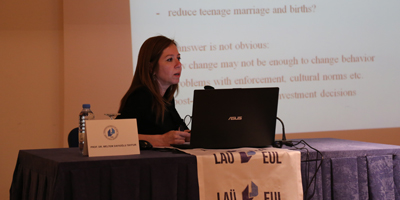“The Effect of Duration of Compulsory Education on Socio-Economic Outcomes” analyzed at EUL
European University of Lefke (EUL) Faculty of Economics and Administrative Sciences Department of Economics organized a conference themed “The Effect of Duration of Compulsory Education on Socio-Economic Outcomes”. Academician of Middle East Technical University Department of Economics Prof. Dr. Meltem Dayıoğlu Tayfur attended the conference as a speaker and shared the “The Effect of Duration of Compulsory Education on Socio-Economic Outcomes” with the students and academicians.
Tayfur: Although compulsory schooling had a more significant impact on the enrollment rate of girls, this did not diminish the educational gap between genders
Tayfur said that in their study they observed that there are socioeconomic effects of changing the duration of compulsory education and added that schooling rate has increased with the state’s investment expenditures on education and this increase has been seen as an important finding in favor of female students both in urban and rural areas. Tayfur said that while the rate of completing the eight-year compulsory education increased by 30-40% among girls in rural areas, it increased by 10-18% after compulsory education (high school) among boys in urban areas and added that “Although compulsory education had a more significant impact on the enrollment rate of girls, this did not diminish the educational gap between the genders, especially in urban areas”.
Tayfur: Positive socioeconomic effects of compulsory education are seen especially in young ages
Tayfur stated that the increase in the duration of education of girls due to compulsory education increased the enrollment rate of boys after compulsory education, leading to an increase in male labor force participation rate compared to women and increased the gender gap. She further continued that “However, the increase in the duration of compulsory education resulted in a decrease in rural-urban differences” and added that this difference in girls decreased to 0.7-0.8 and in boys to 0.5 years.
Pointing out that positive socioeconomic effects of compulsory education are seen especially in young ages Tayfur said that such analyzes are important to see the results of the policies implemented and that many countries support such studies. Sharing the socio economic effects that stem from increasing the duration of compulsory education from 5 year to 8 year in 1997, Tayfur said that the socioeconomic effects of compulsory education, which increased to 4 + 4 + 4 in 2012 and 12 years in total, are also ongoing research topics.

